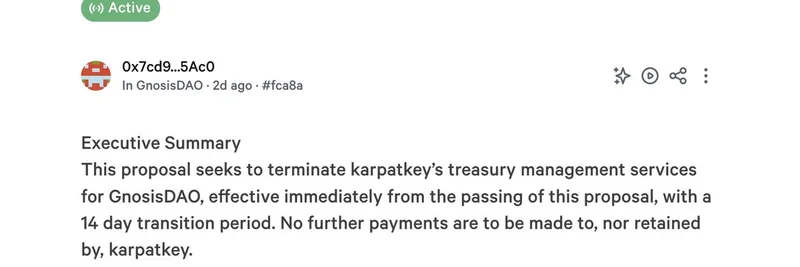GnosisDAO, a decentralized autonomous organization focused on prediction markets and blockchain tools, has put forward a significant proposal that's stirring up conversations in the crypto space. Known as GIP-143, this initiative asks whether the DAO should end its treasury management services contract with Karpatkey, a specialized DeFi asset manager.
For those new to the scene, a DAO is like a community-run company on the blockchain where decisions are made through voting by token holders. GnosisDAO holds a substantial treasury—think millions in crypto assets—and has relied on Karpatkey since late 2021 to handle it non-custodially, meaning Karpatkey suggests moves but doesn't control the funds directly.
The proposal went live on Snapshot, a popular voting platform for DAOs, and it's open until November 24, 2025, at midnight UTC. You can check it out and vote if you're a GNO holder here.
What's the Proposal About?
In simple terms, GIP-143 wants to cut ties with Karpatkey right away if it passes, with a two-week handover period. No more payments to them, and nothing held back. It's a clean break.
The executive summary spells it out clearly: terminate the services effective immediately upon approval, with that 14-day transition. This comes after weeks of community chats about how the treasury's been performing, the costs involved, risks taken, and whether it all lines up with what GnosisDAO aims to achieve.
Why Now? The Backstory
Karpatkey started as part of Gnosis but spun off into its own entity in 2024, complete with its KPK token. They've managed over $2 billion in assets for various DAOs, including Gnosis, using strategies like yield farming and liquidity provision on protocols like Balancer.
But recent events have raised eyebrows. Just a couple of weeks ago, in early November 2025, Balancer—a DeFi liquidity protocol—suffered a massive hack, losing over $120 million due to a smart contract vulnerability. While not directly confirmed, sources suggest GnosisDAO's treasury had exposure through Karpatkey's strategies, leading to potential losses or at least heightened risks.
Community frustration has been building, as noted in various crypto news outlets. Discussions highlight concerns over performance metrics, high management fees, and whether Karpatkey's risk appetite matches the DAO's conservative goals. For instance, one report mentioned accumulating discontent post-Balancer incident, prompting this formal push to reevaluate the partnership.
This isn't the first time treasury management has been under the microscope. Earlier proposals like GIP-20 and GIP-58 solidified Karpatkey's role, but evolving DeFi landscapes and incidents like this hack remind everyone that nothing's set in stone.
Implications for the Broader Crypto World
If GIP-143 passes, it could signal a shift in how DAOs handle their treasuries. Many meme token projects and smaller DAOs look to models like Gnosis for inspiration. Terminating a long-term manager like Karpatkey might encourage more in-house management or diversification to multiple providers, reducing single-point risks.
For meme token enthusiasts, this is a reminder that even big players face DeFi pitfalls. Treasury strategies often involve staking or providing liquidity for tokens, including volatile memes, to generate yields. A shake-up here could influence how communities approach risk in their own holdings.
On the flip side, if it fails, it reaffirms trust in Karpatkey, who recently raised $7 million to expand services. They've been praised for non-custodial approaches and helping DAOs like Safe and others navigate complex finances.
What's Next?
Voting is underway, and results could reshape GnosisDAO's operations. If you're involved in blockchain or hold GNO, this is worth watching. For more on DAO governance and treasury tips, stay tuned to Meme Insider—we're here to break down the latest in a way that's easy to digest.
Check out the original tweet announcing the vote here for the full scoop.

